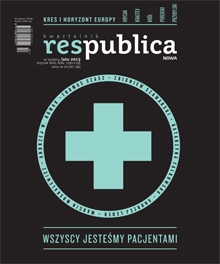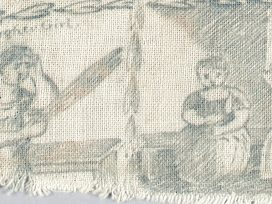
While book publishing is an ailing industry, children’s books are booming. But political attacks and censorship are also threatening this thriving sector.
The benefits of greater dialogue between female and male authors are not limited to the treatment of gender as a topic per se, writes Magdalena Malinska. Which is why the Polish quarterly Res Publica Nowa is increasingly publishing articles co-authored by female and male authors.
Res Publica Nowa does not have a policy on gender, never has had and probably never will. Although among authors, lecturers and also academics interested in the history of ideas you can still find more men than women, the disproportion in gender representation is constantly decreasing – a result of much wider cultural change and the evolution of public debate in Poland.
As Res Publica Nowa is actually a non-governmental organization and relies mostly on grants for finance, we hire only freelancers. In 2012, we drew on the services of 14 female and ten male freelancers. Among volunteers working on the journal, 21 were women and six men. None of the key organizations essential to the journal’s publication, including funders, exercise any influence as regards the gender of those working on the journal.
We all work part time. The editor-in-chief is male, but we have two vice editors-in-chief – one male and one female. There are also two editorial assistants: again, one male and one female. Of the editors, eight are male and seven females. We currently publish three print magazines (the quarterly flagship journal Res Publica Nowa, and two other occasional magazines) and online too.
The foundation’s board and the council of the board are currently all men. So the chair and deputy of the foundation that supports the journal are men (they are the foundation’s co-founders). Wages are not in any way related to gender – wages depend on the type of work. All tasks and wages are precisely defined in the project descriptions we provide for the institutions that finance our projects.
Wages are not in any way related to gender – wages depend on the type of work. All tasks and wages are precisely defined in the project descriptions we provide for the institutions that finance our projects.
I have been an editor of Res Publica Nowa since 2008, when the whole editorial staff changed (the quarterly journal was entrusted to a younger generation). During my time as editor, the number of women among the staff has grown. A majority of interns are women too.
I expect the number of women among the staff to stay the same, but the number of female authors to increase – that’s due to the slow, but constant and general change in Poland’s culture, which involves more and more women in the public debate and journalism.
In 2012 we published 97 male and 29 female authors. However, we do not take gender into consideration when commissioning: we are only interested in the strength of the arguments and general quality of the article. Having said which, searching for female contributors does not necessarily require extra work. We simply do not steer the ratio of female to male authors in any way, neither do we see a need for quotas relating to the gender of staff or contributors. Furthermore, we haven’t noticed any connection between the author’s gender and their skills in writing about gender.
As for issues that have contained significant, gender-related content, these are relatively few in number. This year’s special issue on cultural animators included an article entitled “Intergenerational voices”, in which four women (Zofia Bisiak, Joanna Zak, Karolina Pluta, Klara Kopcinska) discussed their work as cultural animators. And in 2009, we had a focus on feminism, women and theology. The relevant articles specifically required the input of Polish, female specialists.
Little has changed in this respect – there were no issues devoted to gender in the past. That said, many of the articles published in our culture section are somehow related to gender-related topics. What is more, we expect every article published in Res Publica Nowa, whatever the main topic is, to express an awareness of gender issues. However, I personally would like to propose and realize more main topics concerning typically “female” issues, which would naturally require more female authors.
The scope for handling gender in the journal could certainly benefit from greater dialogue between female and male authors, and we are constantly try to facilitate such dialogue. Indeed, we are publishing more and more articles co-authored by female and male authors, though these do not necessarily deal with gender. I perceive discussion about gender as reaching another level, when articles co-authored in this way explore other topics too.
Published 14 November 2013
Original in English
First published by Eurozine
Contributed by Res Publica Nowa © Magdalena Malinska / Res Publica Nowa / Eurozine
PDF/PRINTSubscribe to know what’s worth thinking about.

While book publishing is an ailing industry, children’s books are booming. But political attacks and censorship are also threatening this thriving sector.

Being diagnosed with ADHD can be a relief for those who have struggled long and hard to adopt constraining social norms. For neurodivergent women, masking can lead to poor mental health, substance abuse and hyper-sexuality. Vox Feminae takes a first-hand dive into positive coping mechanisms for the inattentive and/or hyperactive.